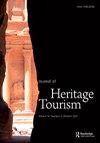南太平洋的全球化、手工业和旅游业微型企业:经济和社会文化层面
IF 2.2
Q2 HOSPITALITY, LEISURE, SPORT & TOURISM
引用次数: 1
摘要
摘要本研究从南太平洋地区以女性为主的市场商贩和微型企业的角度,评估了手工艺品和纪念品行业的经济和社会文化维度。它的重点是所罗门群岛和瓦努阿图两个国家,这两个国家在旅游发展水平、旅游特点和现有的旅游影响研究方面各不相同。手工艺和纪念品业务为偏远和新兴岛屿经济体提供了经济机会,但面临全球化和旅游业的挑战。所罗门群岛优先考虑当地制作的艺术品,而瓦努阿图在很大程度上依赖进口纪念品,尤其是大型游轮市场。这种做法往往导致当地文化和目的地的商品化和歪曲,因为企业迎合游客的需求,并参与更广泛的国际交流和全球化进程。虽然微型企业家普遍对他们在大流行病前出售手工艺品和纪念品获得的收入表示满意,但数据表明,主要来自游轮旅游的收益分配不均。关键词:手工艺品、纪念品、微创业、南太平洋、全球化、旅游影响披露声明作者未报告潜在利益冲突。本研究得到了南太平洋大学商业与经济学院的支持。亚历山大·特鲁普,马来西亚双威大学酒店与服务管理学院副院长(研究与研究生课程)兼副教授,《东南亚研究进展》杂志的联合主编。Chetan Shah是新西兰奥克兰大学的一名博士生。他在管理运营、教学、培训和咨询方面有十多年的工作经验。Michael Hitchcock,英国伦敦金史密斯大学创意与文化创业研究所名誉教授,马来西亚双威大学酒店与服务管理学院客座教授。本文章由计算机程序翻译,如有差异,请以英文原文为准。
Globalisation, crafts, and tourism microentrepreneurship in the South Pacific: economic and sociocultural dimensions
ABSTRACTThis research assesses the economic and sociocultural dimensions of the handicraft and souvenir sector from the perspectives of predominantly female market vendors and microbusinesses in the South Pacific region. It focuses on two countries, the Solomon Islands and Vanuatu, which vary in their levels of tourism development, tourist characteristics, and available research on tourism impacts. Handicraft and souvenir businesses offer economic opportunities in remote and emerging island economies but face challenges from globalisation and tourism. The Solomon Islands prioritise locally crafted artworks, while Vanuatu largely depends on importing souvenirs, particularly for the large cruise-ship market. Such practices often lead to commodification and misrepresentation of local cultures and destinations, as businesses cater to the demands of tourists and engage in broader processes of international exchange and globalisation. While micro-entrepreneurs generally express satisfaction with their income from selling handicrafts and souvenirs before the pandemic, data indicate that benefits, mainly from cruise-ship tourism, are unequally distributed.KEYWORDS: Handicraftssouvenirsmicro-entrepreneurshipSouth Pacificglobalisationtourism impacts Disclosure statementNo potential conflict of interest was reported by the author(s).Additional informationFundingThis research was supported by the Faculty of Business and Economics, The University of the South Pacific.Notes on contributorsAlexander TruppAlexander Trupp is Associate Dean (Research and Postgraduate Studies) cum Associate Professor at the School of Hospitality and Service Management, Sunway University, Malaysia, and the co-editor-in-chief of the journal ‘Advances in Southeast Asian Studies’.Chetan ShahChetan Shah is a doctoral student at the University of Auckland, New Zealand. He has more than a decade of work experience in managing operations, teaching, training and consulting.Michael HitchcockMichael Hitchcock is Professor Emeritus at the Institute for Creative and Cultural Entrepreneurship, Goldsmiths University of London, UK and Visiting Professor at the School of Hospitality and Service Management, Sunway University, Malaysia.
求助全文
通过发布文献求助,成功后即可免费获取论文全文。
去求助
来源期刊

Journal of Heritage Tourism
HOSPITALITY, LEISURE, SPORT & TOURISM-
CiteScore
6.50
自引率
11.10%
发文量
39
期刊介绍:
The Journal of Heritage Tourism ( JHT ) is a peer-reviewed, international transdisciplinary journal. JHT focuses on exploring the many facets of one of the most notable and widespread types of tourism. Heritage tourism is among the very oldest forms of travel. Activities such as visits to sites of historical importance, including built environments and urban areas, rural and agricultural landscapes, natural regions, locations where historic events occurred and places where interesting and significant living cultures dominate are all forms of heritage tourism. As such, this form of tourism dominates the industry in many parts of the world and involves millions of people. During the past 20 years, the study of tourism has become highly fragmented and specialised into various theme areas, or concentrations. Within this context, heritage tourism is one of the most commonly investigated forms of tourism, and hundreds of scholars and industry workers are involved in researching its dynamics and concepts. This academic attention has resulted in the publication of hundreds of refereed articles in various scholarly media, yet, until now there has been no journal devoted specifically to heritage tourism; Journal of Heritage Tourism was launched to fill this gap. JHT seeks to critically examine all aspects of heritage tourism. Some of the topics to be explored within the context of heritage tourism will include colonial heritage, commodification, interpretation, urban renewal, religious tourism, genealogy, patriotism, nostalgia, folklore, power, funding, contested heritage, historic sites, identity, industrial heritage, marketing, conservation, ethnicity, education and indigenous heritage.
 求助内容:
求助内容: 应助结果提醒方式:
应助结果提醒方式:


